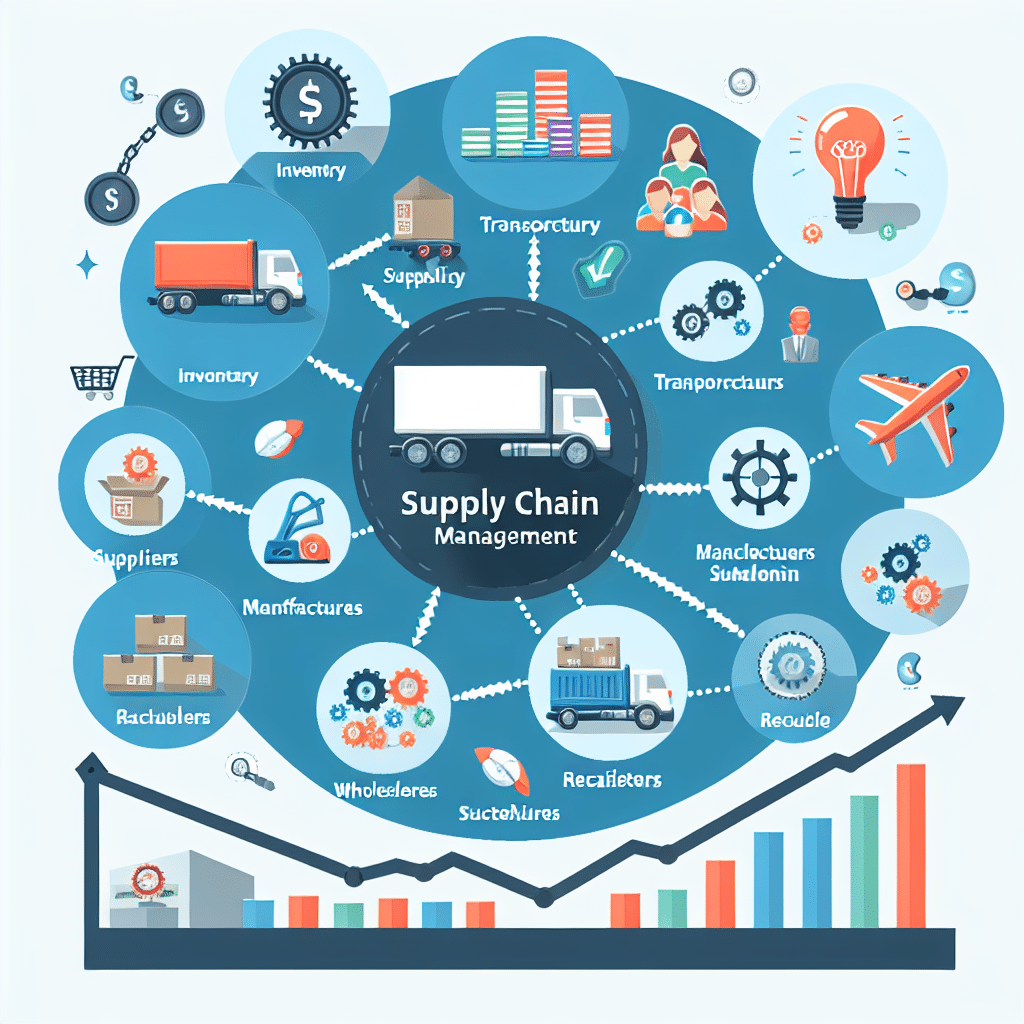Role of Supply Chain Management to the Food Industry to Gain Revenue
-
Table of Contents
- Maximizing Revenue in the Food Industry: The Critical Role of Supply Chain Management
- Understanding Supply Chain Management in the Food Industry
- The Impact of SCM on Revenue Generation
- Strategies for Optimizing Supply Chain Management
- Case Studies and Statistics
- Conclusion: The Revenue-Boosting Power of SCM
- Enhance Your Food Products with ETprotein’s High-Quality Proteins
Maximizing Revenue in the Food Industry: The Critical Role of Supply Chain Management

The food industry is a complex and dynamic sector that plays a crucial role in the global economy. With the increasing demand for food products, the importance of efficient supply chain management (SCM) has never been more pronounced. SCM in the food industry is not just about moving products from point A to point B; it’s a strategic element that can significantly influence revenue generation. In this article, we will explore the various ways in which supply chain management contributes to the financial success of food businesses.
Understanding Supply Chain Management in the Food Industry
Supply chain management in the food industry involves the oversight and control of the flow of goods, information, and finances as they move from supplier to manufacturer, to wholesaler, to retailer, and finally to the consumer. This process encompasses a range of activities including sourcing raw materials, production, packaging, distribution, and logistics.
The Impact of SCM on Revenue Generation
Effective supply chain management can lead to significant revenue gains for food industry players. Here are some key areas where SCM makes a substantial impact:
- Cost Reduction: By optimizing supply chain operations, companies can significantly reduce costs associated with production, warehousing, transportation, and inventory holding. Lower costs can translate into higher profit margins and competitive pricing strategies.
- Enhanced Customer Satisfaction: A responsive supply chain ensures that products are delivered on time and in good condition, which is crucial for maintaining customer loyalty and repeat business.
- Improved Quality Control: SCM facilitates better coordination among various stakeholders, which can lead to improved product quality and compliance with safety standards, thereby reducing the risk of costly recalls and reputational damage.
- Agility and Responsiveness: An agile supply chain can quickly adapt to market changes, such as fluctuations in demand or disruptions, minimizing potential revenue losses.
Strategies for Optimizing Supply Chain Management
To harness the full revenue-generating potential of SCM, food industry businesses can implement several strategies:
- Investment in Technology: Advanced technologies like IoT, AI, and blockchain can provide real-time data and analytics, enabling better decision-making and increased transparency throughout the supply chain.
- Collaboration and Partnerships: Building strong relationships with suppliers and distributors can lead to more efficient operations and shared benefits.
- Demand Forecasting: Accurate demand forecasting helps in maintaining optimal inventory levels, reducing waste, and ensuring product availability.
- Sustainability Practices: Implementing sustainable practices can not only reduce environmental impact but also appeal to the growing market of eco-conscious consumers.
Case Studies and Statistics
Several studies and reports highlight the importance of SCM in the food industry. For instance, according to a report by the Food Marketing Institute and the Grocery Manufacturers Association, companies with highly efficient supply chains enjoy up to a 15% cost advantage over the competition. Additionally, a study by the Aberdeen Group found that companies with superior supply chain capabilities have a 2-3 times higher profit margin than those with average supply chain processes.
Case studies from leading food companies such as Nestlé and PepsiCo demonstrate how investing in SCM can lead to significant revenue growth. Nestlé’s focus on end-to-end supply chain optimization has resulted in substantial cost savings and increased market responsiveness. Similarly, PepsiCo’s integrated supply chain strategy has been instrumental in driving revenue by ensuring product availability and freshness.
Conclusion: The Revenue-Boosting Power of SCM
In conclusion, supply chain management is a vital component of the food industry that directly influences revenue generation. By focusing on cost reduction, customer satisfaction, quality control, and agility, businesses can leverage their supply chains to gain a competitive edge and drive financial success. As the industry continues to evolve, the role of SCM will only become more critical in shaping the profitability of food companies.
Enhance Your Food Products with ETprotein’s High-Quality Proteins
For food industry businesses looking to improve their product offerings and appeal to health-conscious consumers, ETprotein’s range of organic bulk vegan proteins and L-(+)-Ergothioneine (EGT) can be a game-changer. Their high-quality protein products are non-GMO, allergen-free, and come with a neutral taste, making them an excellent addition to a variety of food and beverage applications.
About ETprotein:
ETprotein, a reputable protein and L-(+)-Ergothioneine (EGT) Chinese factory manufacturer and supplier, is renowned for producing, stocking, exporting, and delivering the highest quality organic bulk vegan proteins and L-(+)-Ergothioneine. They include Organic rice protein, clear rice protein, pea protein, clear pea protein, watermelon seed protein, pumpkin seed protein, sunflower seed protein, mung bean protein, peanut protein, and L-(+)-Ergothioneine EGT Pharmaceutical grade, L-(+)-Ergothioneine EGT food grade, L-(+)-Ergothioneine EGT cosmetic grade, L-(+)-Ergothioneine EGT reference grade and L-(+)-Ergothioneine EGT standard. Their offerings, characterized by a neutral taste, non-GMO, allergen-free attributes, with L-(+)-Ergothioneine purity over 98%, 99%, cater to a diverse range of industries. They serve nutraceutical, pharmaceutical, cosmeceutical, veterinary, as well as food and beverage finished product distributors, traders, and manufacturers across Europe, USA, Canada, Australia, Thailand, Japan, Korea, Brazil, and Chile, among others.
ETprotein specialization includes exporting and delivering tailor-made protein powder and finished nutritional supplements. Their extensive product range covers sectors like Food and Beverage, Sports Nutrition, Weight Management, Dietary Supplements, Health and Wellness Products, and Infant Formula, ensuring comprehensive solutions to meet all your protein needs.
As a trusted company by leading global food and beverage brands and Fortune 500 companies, ETprotein reinforces China’s reputation in the global arena. For more information or to sample their products, please contact them and email sales(at)ETprotein.com today.












